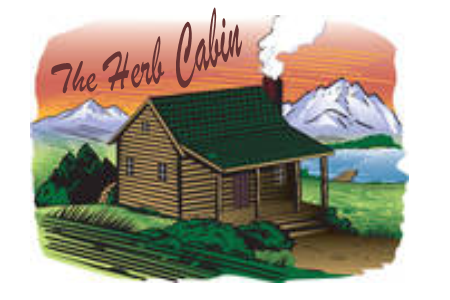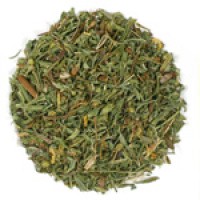The plant takes its name from St. John the Baptist for it usually begins to bloom on his feast day, June 24th. The word wort simply
means herb. At one time, St. John’s Wort did flavor brandy, and bakers
added a pinch to flour to improve bread’s texture. In the Victorian
Language of Flowers, St. John’s Wort represents animosity. It’s been
used for centuries for depression, melancholy and hysteria.
One study by Dittmann, Hermann and Palleske showed that Hyperforat, a preparation based on a total extract, gave a well-reproducible specific inhibition of anaerobic glycolysis in secretions of brain tumors. An infusion of leaves and flowers in olive oil is excellent for skin burns. The herb/flowers are the parts used for lung problems, bladder complaints, diarrhea, dysentery, depression, hemorrhages and jaundice. Steep two teaspoonsful of the herb per cup of water for twenty minute. Take onehalf cup in the morning and one-half cup at bed time. Bedwetting is helped by a nightly cup of the tea or 5-10 drops of the tincture. The oil and fomentation are applied externally to injuries, especially when nerve endings are involved and to soften tumors and caked breasts. The research on St. John’s Wort has been substantiated on its effects on mild to moderate depression.
In
another study in Germany in 1984, depressed women were given a tincture
of St John’s Wort. These women’s symptoms, including anxiety, anorexia,
lack of interest in life and psychomotor problems, all changed for the
better. Research was also conducted in Russia where it was combined with
psychotherapy to treat alcoholics suffering from depression. A
suggested tincture is 1 tsp tincture of St. John’s Wort leaf, ½ tsp
tinctures of licorice root, ginseng root, lemon balm leaf and ashwaganda
leaf. Combine ingredients. Take 1 dropperful 3 times a day. The
mood-lightening effect does not develop quickly—it is necessary to take
it for up to 2-3 months. The first effects will be felt within 2-3
weeks.
Actions:
astringent,
analgestic, antidepressant, antispasmodic, stimulates bile flow,
antiviral, anti-inflammatory, sedative, restorative tonic for the
nervous system.
Toxicity:
Since
it’s an MAO inhibitor it interacts badly with wine, cheese and smoked
or pickled foods and medications such as cold and hay fever remedies,
amphetamines, narcotics, tryptophan and tyrosine. You should not take if
you’re pregnant. One of the reasons for the eradication program in
certain parts of the world is because of the plant’s potential toxicity
to livestock, particularly sheep. When light-skinned livestock, such as
sheep, goats, horses and cattle, ingest the plant and then are exposed
to bright sunlight, they develop welts on their skin and other symptoms.
This reaction has not been reported in humans but the warnings for it
are everywhere.
St Johns Wort - depression, melancholy and hysteria
- Product Code:MH048
- Availability:In Stock
-
R67.50
Available Options
Tags: St Johns Wort, depression, melancholy, hysteria

